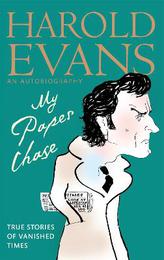
|
My Paper Chase: True Stories of Vanished Times: An Autobiography
Paperback / softback
Main Details
| Title |
My Paper Chase: True Stories of Vanished Times: An Autobiography
|
| Authors and Contributors |
By (author) Harold Evans
|
| Physical Properties |
| Format:Paperback / softback | | Pages:528 | | Dimensions(mm): Height 197,Width 128 |
|
| ISBN/Barcode |
9780349122458
|
| Classifications | Dewey:070.92 |
|---|
| Audience | |
|---|
| Illustrations |
Section: 16, b/w photos
|
|
Publishing Details |
| Publisher |
Little, Brown Book Group
|
| Imprint |
Abacus
|
| Publication Date |
3 June 2010 |
| Publication Country |
United Kingdom
|
Description
From a wartime beach in Wales to the gleaming skyscrapers of twenty-first-century Manhattan, the extraordinary career of Fleet Street legend Harold Evans has spanned five decades of tumultuous social, political and creative change. Just how did a working class Lancashire boy, who failed the eleven-plus, rise to a position where he could so effectively give voice to the unheard? Born in the bleak years between the wars in the sprawl of Greater Manchester into a thrifty, diligent and loving family, Evans inherited only the privilege of his parents' example. Theirs was a work ethic that led Evans through night school classes, national service and a passionate commitment to regional life, and, finally, to his unassailably successful editorship of one of our greatest newspapers, the Sunday Times. Whether unpicking the murderous chaos of Bloody Sunday, pursuing a foreign correspondent's murderers or uncovering the atrocity of Thalidomide, this consummate newsman evokes his contagious passion: for the real story and the truth.
Author Biography
Harold Evans was editor of the Sunday Times from 1967 to 1981, and became responsible for its crusading style of investigative reporting, he has lived in the USA since 1984.
Reviews** In Harold Evans s cottage, behind a beach dune in Quogue, Long Island, there is a black-and-white photograph of a news conference at The Sunday Times when Evans was editor. For me, he writes, it has the exalted resonance of a Nocturne painting by Whistler. It represents the culmination of my life in journalism, 35 years, from reporting in Lancashire to the Manchester Evening News, to foreign reporting in Europe and south-east Asia and the United States for the Evening News and The Guardian, to five years of daily newspaper editing in Darlington and then 14 more years editing The Sunday Times of London Melvyn Bragg TELEGRAPH ** Reading these evocative and enjoyable memoirs, one feels the warmth of his sunny personality even as the lights seem to be going outin much of print journalism. He saw the best of it - o, lucky man! Robert Harris SUNDAY TIMES ** Amid the pervasive gloom surrounding the future of newspapers, Harold Evans has produced a memoir to lift the spirits Lionel Barber FINANCIAL TIMES ** SIR Harold Harry Evans remains one of the great figures of modern journalism. For this reason, and because the kind of campaigning, reporting-based work he stood for is threatened as never before, his autobiography, written as he turned 80, is both gripping and timely ECONOMIST ** Journalists memoirs tend to be as transitory as the great stories they lovingly recall. Few of them impart much of value, except perhaps for a fleeting sense of nostalgia. Harold Evans must surely be counted an exception. because for more than a decade, he ran the best newspaper in the world. The Sunday Times, in the 1970 s, was good because it placed journalism at the heart of the paper, and allowed it free rein SPECTATOR ** Like many others I was lucky to have worked with him. His book is illuminating and entertaining on his personal history and it gives a valuable record of what used to be known as English provincial life; more vital then, perhaps than now. But the important reason to read it is that it tells you how good newspapers were once made and why they still matter GUARDIAN ** Perhaps the most surprising thing about the memoirs of the man who was arguably Britain's greatest editor of the second half of the 20th century is that he doesn't reach the editorial chair of the Sunday Times until page 287, more than halfway through the book. ...Two names ? Samuel Smiles, the Victorian apostle of self-help, and Richard Hoggart, author of The Uses of Literacy ? came to mind as I was reading this engaging tale of the poor lad from Eccles, the son of a train driver, who failed his 11-plus yet rose to become editor of the Times. I found this section moving... OBSERVER
|